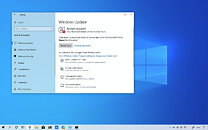Thursday, April 9th 2020

Windows 10 2004 Could Come Out in May
Microsoft could release the next major update to Windows 10, aka 2004, in May as the Windows 10 May 2020 Update (build 19041.173). Codenamed "Manganese," Windows 10 2004 has been released to Windows Insiders (slow ring), who can now either update their current installations or get ISO files for the new operating system. For the rest of us, Microsoft could release the software some time in May. Windows 10 2004 introduces a "restore this PC from the cloud" option, refined Windows Update management system; a more functional Task Manager that can show GPU temperatures; improvements to Cortana, Windows Search, and Network management.
Sources:
Bleeping Computer, WCCFTech

75 Comments on Windows 10 2004 Could Come Out in May
forums.mydigitallife.net/threads/discussion-windows-10-insider-preview-build-19041-1-pc-slow-vb_release.80763/page-78#post-1589246
www.thurrott.com/forums/microsoft/windows/thread/windows-10-about-to-become-a-subscription-product
arstechnica.com/information-technology/2020/03/no-microsoft-isnt-killing-the-control-panel-off-just-yet/
My two cents: It's unlikely that Control Panel will go away completely without making the Settings app reach feature parity first. And that means moving A LOT of things. I don't think we will see that happening in the next two years, unless Microsoft are really that crazy about it, and to be frank I don't think they are.Defrag not working isn't exactly the worst, but TRIM? That's sort of vital for SSDs...
Windows 10 Version 2004 (19041.173)
or is best to just wait for the update?
Good news:
No, serious enterprises (also those important to you: your bank, your payment operator, your online storage, your e-mail provider etc) generally don't hold on to old version of Windows for as long as it's possible (like some people on this forum do). Companies roll out the newest and most secure version as soon as possible.
Bad news:
The reason why companies don't update Windows - or any other significant program - as soon as the update is available, is that they have to test it.
Key issue: compatibility with internal systems (including hardware). Performance tests have to follow as well.
And that testing often forces changes in other systems which obviously also take time.
So the bad part is: if your professional experience was that OS updates were done so close to the end of support, it suggests you had very poor IT departments. Because it probably means that they either didn't finish tests or didn't modify other systems on time. And of course if there are production issues after the roll-out, there's no time to fix them.Don't run installers coming from anonymous file hosting and posted by a forum user who created an account specifically to share them.
Just don't.
Please.
There is so much work in most serious enterprises that keeping an older Windows version that is still in support is simply a necessity. I work for the 6th largest IT consultancy firm in the world and its the exact same story there as it is in the company (one of the largest bank/insurance firms in the country) I'm now hired at; until recently they still had 1803. If there is no competitive edge, Windows versions are just picked by convenience at the time people are planning it or ready for it
Its usually a process of postponing as long as possible, because a large change like this is always a nuisance.
Second, the existence of 3rd party software that adds a feature to windows does not prevent microsoft from adding that feature to their OS. That makes zero sense. Apple clearly wasn't afraid when it added Lux features to it's OS and kicked the app of it's app store.
If Microsoft was never going to add any features to it's OS because a 3rd party already does it, it's operating system would be quickly passed by operating systems that do add features over time.
You know window's virtual desktop feature? That used to be provided by 3rd party software. Same thing as night mode, game mode, and many other features.
So no, don't blame Microsoft. Blame Intel. This may sound like some kind of conspiracy, but I have to wonder if all of the performance increases we've seen lately with Intel chips this past five or so years is because Intel was cheating in some way and those cheats are coming back to bite them in the ass.